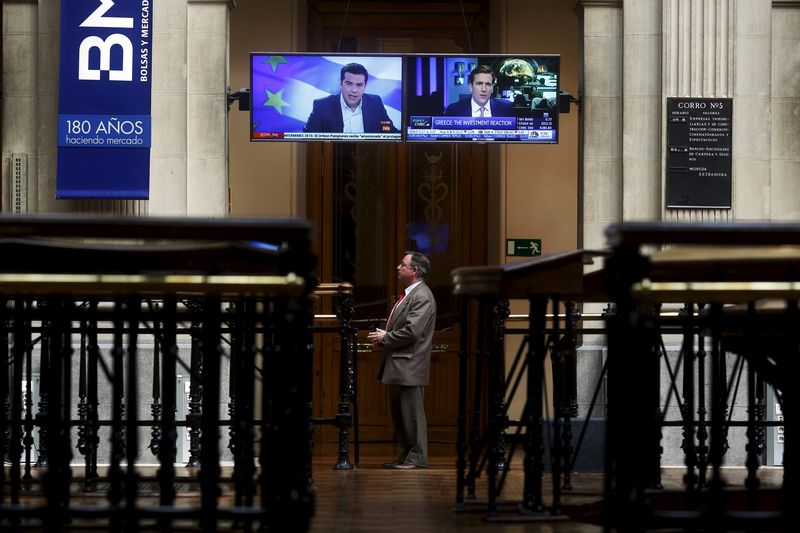* World stocks at 2-month highs but European shares dip
* U.S. stock futures flat to slightly positive
* Oil prices off day's lows
* Focus turning to U.S. ISM non-manufacturing data
* U.S. dollar, Aussie dollar gain (Writes through)
By Dhara Ranasinghe
LONDON, March 3 (Reuters) - World stock markets touched two-month highs on Thursday as easing concern about the global growth outlook and a recovery in commodities lifted risk appetite globally.
Upbeat data from major economies this week and signs of a rebound in a range of commodities have helped restore some calm to global markets after a turbulent start to the year.
Growth in Germany's private sector slid to a five-month low in February but remained solid, underpinned by growing services, a survey showed on Thursday. world equity index .MIWD00000PUS rose to its highest level in two months, the pan-European FTSEurofirst 300 .FTEU3 stock index dipped 0.3 percent but held within sight of Wednesday's one-month peak.
U.S. stock futures meanwhile pointed to a largely unchanged start for Wall Street shares ESc1 1YMc1 NQc1 .
That followed a strong session in Asia, where MSCI's broadest index of Asia-Pacific shares outside Japan .MIAPJ0000PUS added another 1.1 percent to reach a two-month peak.
"For markets to continue to move higher, more good data - especially out of the U.S. - will be needed," said Markus Huber, a trader at City of London Markets.
Focus turned to the U.S. non-manufacturing ISM report due at 1500 GMT, with investors eyeing the employment component for clues about Friday's non-farm payrolls report.
A solid jobs report could bolster expectations that the Federal Reserve remains on track to raise interest rates this year.
Data on Wednesday showed U.S. private-sector jobs rising a surprisingly strong 214,000 in February, adding to speculation that the payrolls report would also be upbeat.
OIL DIPS, COPPER FIRM
Oil prices eased after ballooning U.S. crude inventories and a lack of any fresh action from the world's largest producer to temper supply snuffed out some of the bullish sentiment that has built this week.
Brent crude prices LCOc1 slipped 0.2 percent to $36.86 but are still some 35 percent above last month's lows. U.S. crude futures were marginally higher at $34.68 CLc1 . They have risen more than a third since Feb. 11, when prices dropped to levels not seen since 2003 at just over $26 a barrel.
Copper prices hit their highest in more than three months, boosted by higher equities and some confidence in global growth prospects.
Risk appetite also remained strong in currency markets, with the Australian dollar hitting a two-month high and the safe-haven yen ceding ground to the U.S. dollar and the euro.
The dollar was up 0.5 percent at 114 yen JPY= , moving towards the previous day's two-week high of 114.56. Even the low-yielding euro was up 0.6 percent at 123.95 yen EURJPY= .
"We are seeing better risk appetite weighing on the yen," said Niels Christensen, FX strategist at Nordea. "The focus is on the ISM report, and if, like the manufacturing survey, it is a good one, then we could see the dollar move higher."
The Australian dollar was up 0.5 percent at $0.7338 AUD=D4 its highest level against the dollar since early December. Data showed Australia's fourth-quarter economic growth unexpectedly picked up to an annual 3.0 percent.
The improved tone towards risk assets was also reflected in emerging markets, where stocks rose for the fifth straight day -- their longest winning streak so far this year. BUT CAUTIOUS
The calmer mood in world markets showed in the CBOE Volatility index .VIX , a measure of investor anxiety, which closed at its lowest level so far this year.
Against this backdrop, U.S. Treasury and German Bund yields have pulled away from lows hit in February as greater risk appetite lessens the appeal of safe-haven bonds.
Yet fissures remain in the global outlook, with the European Central Bank likely to ease monetary policy further when it meets next week.
"The overriding economic concerns that were vexing investors at the end of last year are still here - concerns about a weaker Chinese economy, for instance," said Michael Hewson, chief markets analyst at CMC Markets in London. "That makes me cautious about the rebound in stock markets."
